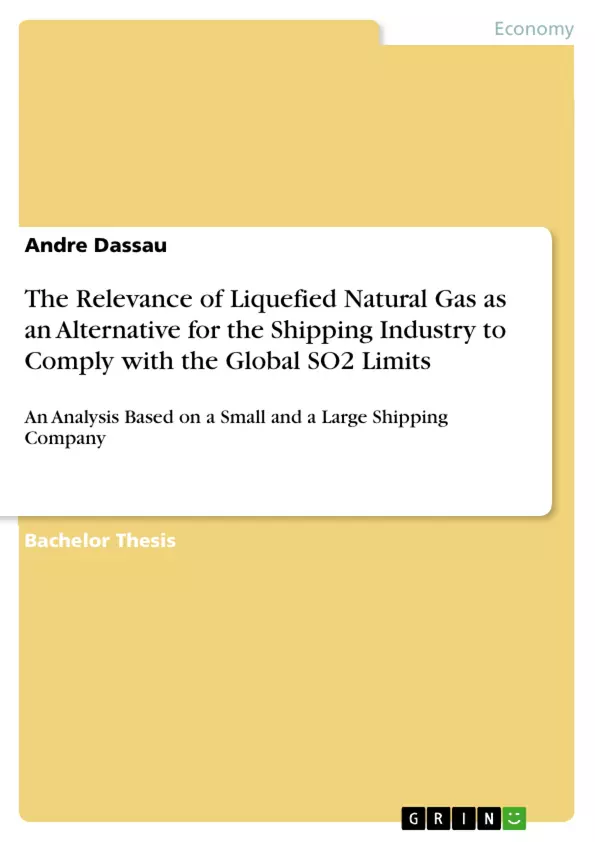
The Relevance of Liquefied Natural Gas as an Alternative for the Shipping Industry to Comply with the Global SO2 Limits
Bachelorarbeit, 2017
50 Seiten, Note: 1,0
Leseprobe
Inhaltsverzeichnis (Table of Contents)
- INTRODUCTION
- RESEARCH PROBLEM
- AIM
- METHODOLOGY
- THE SULPHUR OXIDES LIMITS
- REGULATION 14 OF MARPOL ANNEX VI
- IMPLICATIONS FOR THE SHIPPING INDUSTRY
- 0.5% GLOBAL SULPHUR CAP BY 2020
- LIQUEFIED NATURAL GAS
- DEFINITION
- LNG AS AN ALTERNATIVE ENERGY SOURCE FOR COMPLIANCE
- GLOBAL LNG TRADE
- LNG BUNKERING
- ADVANTAGES AND DISADVANTAGES OF LNG FOR SHIPPING COMPANIES
- CASE STUDIES
- THE SMALL SHIPPING COMPANY
- THE LARGE SHIPPING COMPANY
- MAIN FINDINGS
- CONCLUSION
- SUMMARY
- CRITICAL ACCLAIM
- OUTLOOK
Zielsetzung und Themenschwerpunkte (Objectives and Key Themes)
This bachelor thesis aims to explore the relevance of LNG as a maritime fuel, particularly in light of the impending global sulphur cap set to take effect in 2020. The study focuses on the decision-making process of both a small and a large shipping company regarding the adoption of LNG as a means to achieve compliance with the new regulations. It investigates the key drivers and impediments influencing their choices, as well as their perspectives on the future of LNG in the shipping industry.
- The impact of the global sulphur cap on the shipping industry
- The potential of LNG as an alternative fuel for compliance
- Challenges and opportunities associated with LNG adoption
- The role of bunkering infrastructure in LNG uptake
- The decision-making processes of shipping companies regarding LNG
Zusammenfassung der Kapitel (Chapter Summaries)
The first chapter introduces the research problem, which focuses on the relevance of LNG as a maritime fuel for achieving compliance with the global sulphur cap. It outlines the thesis's aim and methodology. Chapter 2 delves into the sulphur oxides limits imposed by the International Maritime Organization (IMO), specifically focusing on Regulation 14 of MARPOL Annex VI and the implications for the shipping industry. The chapter also discusses the 0.5% global sulphur cap that will come into effect in 2020. Chapter 3 provides a comprehensive overview of Liquefied Natural Gas (LNG), including its definition, its role as an alternative energy source for compliance, the global LNG trade, and LNG bunkering. It also explores the advantages and disadvantages of LNG for shipping companies.
Chapter 4 presents case studies of a small and a large shipping company, examining their perspectives on LNG adoption in relation to the global sulphur cap. This chapter investigates the major drivers and impediments considered by both companies, as well as their forecasts for the future of LNG in the shipping industry.
Schlüsselwörter (Keywords)
The key focus areas of this thesis include LNG, the shipping industry, maritime fuel, bunker, global sulphur cap, compliance, and the challenges associated with LNG adoption. It explores the decision-making processes of both small and large shipping companies regarding the use of LNG as a viable solution to achieve compliance with the new regulations. The study sheds light on the importance of bunkering infrastructure and its role in the broader adoption of LNG as a marine fuel.
Frequently Asked Questions about LNG in Shipping
What is the "Global Sulphur Cap 2020"?
It is a regulation by the IMO that limits the sulphur content in marine fuels to 0.5% for all ships operating globally.
Why is LNG considered an alternative to traditional marine fuels?
LNG (Liquefied Natural Gas) offers significant environmental benefits, as it almost entirely eliminates sulphur oxide emissions.
What is the "chicken-and-egg problem" in LNG adoption?
Shipping companies are reluctant to adopt LNG due to lack of bunkering infrastructure, while providers are slow to build infrastructure due to low demand.
How do small and large shipping companies differ in their approach to LNG?
The study explores their different decision-making processes, financial constraints, and forecasts regarding the future of the technology.
Where is LNG bunkering currently most available?
Currently, small-scale bunkering facilities are mostly available in Northern Europe and the Baltic region.
Details
- Titel
- The Relevance of Liquefied Natural Gas as an Alternative for the Shipping Industry to Comply with the Global SO2 Limits
- Untertitel
- An Analysis Based on a Small and a Large Shipping Company
- Hochschule
- Hochschule für Angewandte Wissenschaften Hamburg
- Note
- 1,0
- Autor
- Andre Dassau (Autor:in)
- Erscheinungsjahr
- 2017
- Seiten
- 50
- Katalognummer
- V379487
- ISBN (eBook)
- 9783668568013
- ISBN (Buch)
- 9783668568020
- Dateigröße
- 932 KB
- Sprache
- Englisch
- Schlagworte
- LNG shipping industry fuel bunker global sulphur cap compliance
- Produktsicherheit
- GRIN Publishing GmbH
- Preis (Ebook)
- US$ 19,99
- Preis (Book)
- US$ 29,99
- Arbeit zitieren
- Andre Dassau (Autor:in), 2017, The Relevance of Liquefied Natural Gas as an Alternative for the Shipping Industry to Comply with the Global SO2 Limits, München, Page::Imprint:: GRINVerlagOHG, https://www.diplomarbeiten24.de/document/379487
- Autor werden
- Ihre Optionen
- Vertriebskanäle
- Premium Services
- Autorenprofil
- Textarten und Formate
- Services für Verlage, Hochschulen, Unternehmen

- © GRIN Publishing GmbH.
- Alle Inhalte urheberrechtlich geschützt. Kopieren und verbreiten untersagt.
- info@grin.com
- AGB
- Open Publishing
Der GRIN Verlag hat sich seit 1998 auf die Veröffentlichung akademischer eBooks und Bücher spezialisiert. Der GRIN Verlag steht damit als erstes Unternehmen für User Generated Quality Content. Die Verlagsseiten GRIN.com, Hausarbeiten.de und Diplomarbeiten24 bieten für Hochschullehrer, Absolventen und Studenten die ideale Plattform, wissenschaftliche Texte wie Hausarbeiten, Referate, Bachelorarbeiten, Masterarbeiten, Diplomarbeiten, Dissertationen und wissenschaftliche Aufsätze einem breiten Publikum zu präsentieren.
Kostenfreie Veröffentlichung: Hausarbeit, Bachelorarbeit, Diplomarbeit, Dissertation, Masterarbeit, Interpretation oder Referat jetzt veröffentlichen!
- GRIN Verlag GmbH
-
- Nymphenburger Str. 86
- 80636
- Munich, Deutschland
- +49 89-550559-0
- +49 89-550559-10
- info@grin.com
-









